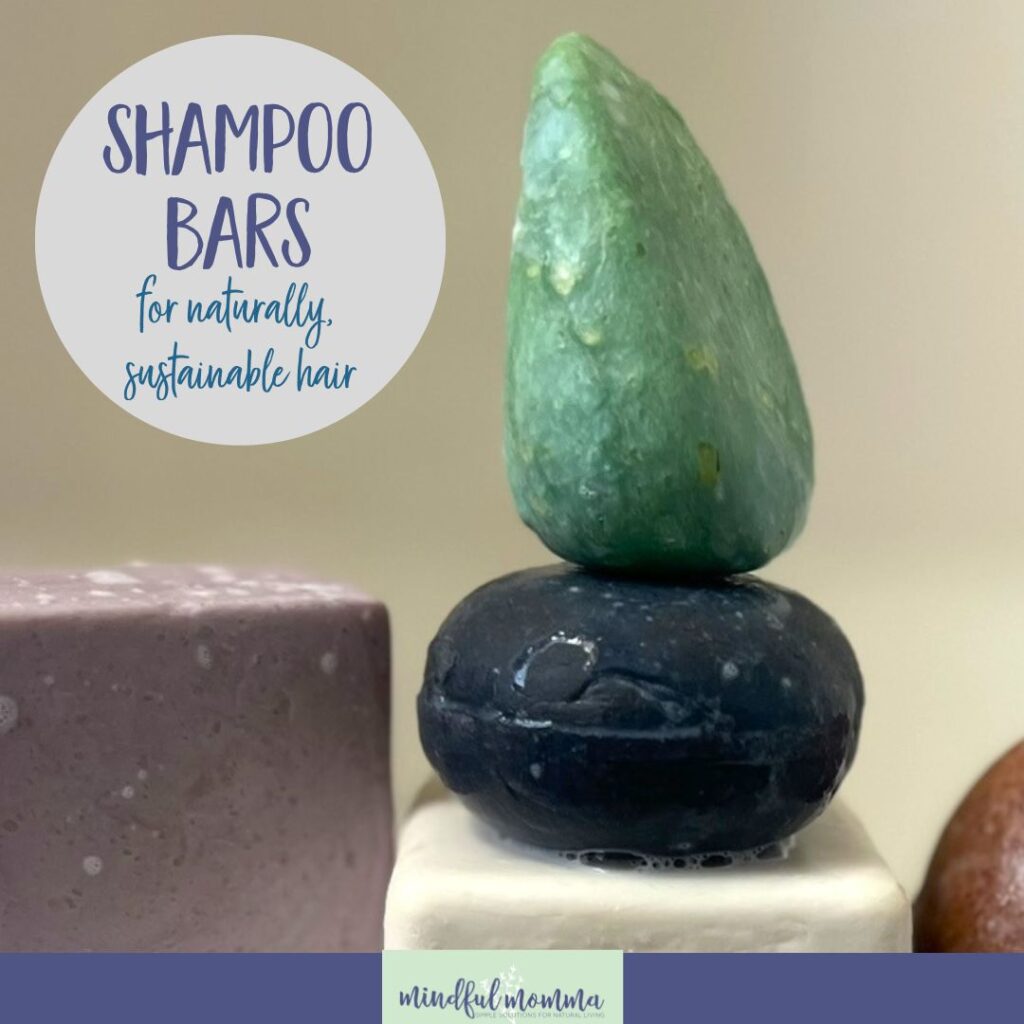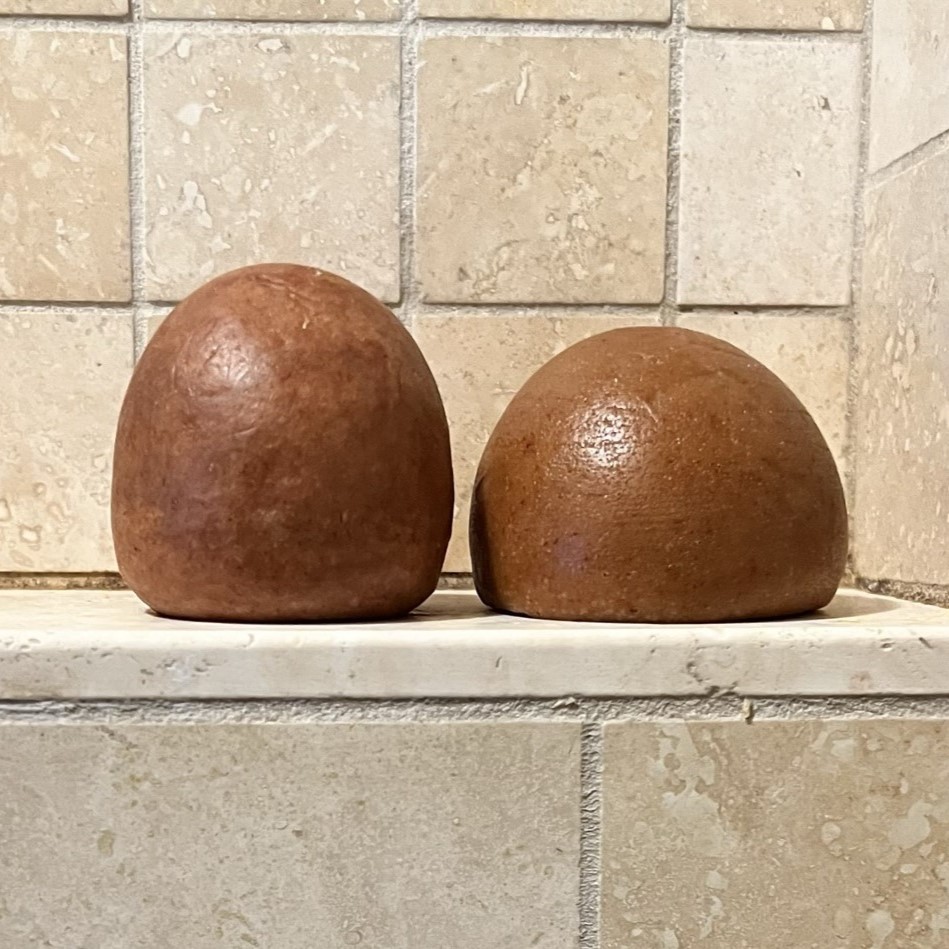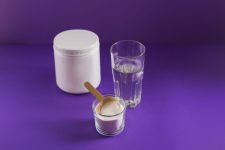Best Natural Shampoo Bars for Sustainable, Healthy Hair
12 min read
Explore the world of natural shampoo bars, where eco-friendliness meets luxurious haircare. Our guide delves into the benefits of these bars for both your hair and the planet. From gentle cleansing to sustainable packaging, discover guilt-free, gorgeous haircare options for all types of hair.
I’ve watched with excitement as natural shampoo bars gain traction in the world of personal care. Why? Because shampoo bars offer a practical, zero-waste alternative to the plastic shampoo bottles that typically crowd our bathroom shelves.
Since I know that most of you here at Mindful Momma are looking to reduce plastic in your lives, I thought it would be helpful to do a little overview of the benefits of shampoo bars and a review of the best shampoo bar brands (and the accompanying conditioner bars).
So I hit the shower with a bunch of different shampoo bars in order to test them out and evaluate the pros and cons.
We’ll also have a discussion about how to best use shampoo bars, because let’s face it, a shampoo bar is quite different than a bottle of liquid shampoo, but definitely a habit change you can adopt. So let’s get into it…
The Environmental Impact of Traditional Shampoos
As you comb through the beauty aisles, you are confronted with aisle after aisle of plastic bottles. Traditional liquid shampoos come in single-use plastic bottles, and they are piling up in our landfills and oceans. We know that a dismaying amount of this plastic never sees the recycling bin, and worse yet, it can take centuries to break down.
On top of the plastic dilemma, traditional shampoos are often teeming with harsh chemicals. Some of these, like certain sulfates and parabens, are known to cause harm when they wash down our drains and enter waterways. The chemical runoff from these products can disrupt aquatic ecosystems and harm wildlife. They can also infiltrate our soil and, eventually, our food supply.
My shift towards more eco-conscious choices has made me keenly aware of the domino effect our daily actions can have. Acknowledging the environmental impact of traditional shampoos was the nudge I needed to explore alternatives, like zero waste shampoo bars, that are better for both people and the planet.
RELATED: A Roundup of Zero Waste Bathroom Products
Why Use Shampoo Bars Over Conventional Shampoo?
Switching to shampoo bars is like giving your haircare routine a green makeover. Say goodbye to bulky plastic bottles, and hello to compact, solid shampoo with minimal packaging.
The benefits of shampoo bars over liquid shampoo include:
Reducing Plastic Use: One of the standout perks of solid shampoo bars is how they help us cut down on plastic consumption. Every bar is one less plastic bottle in landfills or oceans, making a dent in the global plastic problem.
Natural Ingredients: Many shampoo bars are free from sulfates, parabens, and other harsh chemicals, however it’s important to read the ingredients label to assure you are buying a natural and non-toxic shampoo bar. High-quality shampoo bars are packed with nourishing ingredients that are kinder to your scalp and promote hair health without stripping away natural oils.
Travel Convenience: The beauty of waterless shampoo bars is that they won’t spill in your bag or take up much space, making them perfect for travelers looking to streamline their toiletries. Plus, without liquid to worry about, they’re airplane-friendly, saying goodbye to TSA’s liquid restrictions.
Less Waste: Bonus! Shampoo bars last longer than their liquid counterparts because you use exactly what you need, resulting in less waste and more savings over time. The bars’ concentrated form means they require less water to produce and possess a smaller carbon footprint during transport, directly trimming the environmental toll.
Taking all these benefits into account, it’s clear that making the switch to plastic free shampoo bars can be a small step for you but a giant leap for sustainable living. 🌎
RELATED: Favorite Clean Shampoo Brands
Understanding Shampoo Bar Ingredients
As the popularity of shampoo bars grows, it’s important to understand that not all shampoo ingredients are healthy for people and the planet. Let’s take a look:
Ingredients to AVOID in Shampoo Bars
Because shampoo bars are solid and not liquid, they typically don’t need strong preservatives, but they may still have some harsh, artificial ingredients. Try to avoid the following ingredients in the shampoo bars you choose:
- sodium lauryl sulfate (SLS) and sodium lauryth sulfate (SLES)
- ethoxylated ingredients ending in eth like ceteareth and oleth
- polyethylene glycol (PEG) compounds
- artificial fragrances or parfum (often contain parabens)
- artificial colors
A note about sulfates: Many shampoo bars use a gentler surfactant called sodium coco sulfate (SCS), which is less irritating than sodium laurel sulfate (SLS). It is derived from the fatty acids of coconuts and is a mild cleanser that makes the bars lather. Other shampoo bars use a surfactant called sodium cocoyl isethionate (SCI), which is not a sulfate but still does create lather. If you are looking for a completely sulfate-free shampoo bar, look for sodium cocoyl isethionate.
Here’s a good explanation about sulfates in shampoo if you are interested.
Beneficial Ingredients in Shampoo Bars
On a positive note, there are many ingredients in shampoo bars that work hard to keep your hair looking it’s best, no matter what your hair type.
- Conditioning Agents: To help soften and detangle hair, most shampoo bars include some type of conditioning agent. These can include ingredients like cocoa butter, shea butter, or various plant-based oils such as coconut oil, jojoba oil, avocado oil, argan oil or castor oils.
- Glycerin: Glycerin is a humectant that helps to retain moisture in the hair, leaving it hydrated and smooth.
- Essential Oils: Many shampoo bars include essential oils for fragrance, as well as for their potential benefits for the hair and scalp. For example, tea tree oil is often added for its antibacterial properties, while lavender oil may be included for its calming effects.
- Herbal Extracts: Shampoo bars may also include herbal extracts such as nettle, horsetail, chamomile or rosemary, or other natural additives like aloe vera, activated charcoal or sea salt which are believed to have benefits for the hair and scalp.
- Panthenol (Vitamin B5): Panthenol is known for its moisturizing properties and is often added to hair care products to enhance hydration and promote a smoother texture.
- Clays: Clays like kaolin or bentonite may be included to help absorb excess oil and impurities from the hair and scalp.
How to Choose the Best Natural Shampoo Bars for YOU
Finding the ideal shampoo bar for your locks might seem daunting, but with a focus on your hair’s unique characteristics such as porosity and texture, you’ll discover a match that feels like it was crafted just for you.
Bonus: Many brands offer a hair quiz to help you figure out which formula will work best for your hair.
Keep in mind that some people may be sensitive or allergic to certain ingredients, so it’s advisable to check the ingredient list before using a new product.
Here are some general guidelines to help you find the best shampoo bar for your needs:
- Dry hair – Look for a moisturizing shampoo bar made with nourishing oils and hydrating extracts.
- Oily hair – Try a shampoo bar that contains activated charcoal or clay to absorb excess oil and detoxify the scalp.
- Curly hair – Look for a bar that is rich with shea butter or cocoa butter and squalane to control frizz.
- Colored hair – A bar with Panthenol (Vitamin B5) is helpful for color-treated hair.
- Flaky scalp – Try out a soothing shampoo bar made with neem oil and tea tree oil or rosemary essential oils to help soothe an itchy scalp and control flakes.
- Dull hair – To remove buildup and invigorate limp, lifeless hair, try a clarifying shampoo bar made with clay, activated charcoal, dandelion root or apple cider vinegar.
- Fine hair -To strengthen and volumize fine hair look for a shampoo bar with keratin or soy protein extract.
- Grey hair – To tone down brassiness and brighten up grey, white or blond hair, look for a purple shampoo bar made with ultra-violet pigments.
Given all the shampoo bars available today, I have no doubt you’ll be able to find the perfect bar for your specific type of hair!
Top 12 Natural Shampoo Bar Brands
To be clear, I haven’t tested out ALL of these brands, but I have tried quite a few of them. I personally have thick, wavy/curly hair so obviously I’m not going to be the best expert on shampoo bars for oily hair or thinning hair.
However, I’ve done the research to help identify the best-of-the-best shampoo bars for all hair types. If you are looking for a vegan shampoo bar, rest assured, most of these bars are vegan. And be sure to check out the related conditioner bars too – because you are probably going to want to have both.
Best Suds: ATTITUDE Leaves Bar Shampoo Bar



- Made in: Canada
- Types: Volumizing, Nourishing, Hydrating, Detox
- Certifications: EWG VERIFIED™, PETA Certified
- Vegan: YES
- Sulfate-free: NO
- Price: $14.95 for 4-oz bar
- Pros: One of the best suds of all the bars I’ve tried.
- Cons: Both the shampoo bars and conditioner bars are the same square shape so it’s hard to tell the difference between them.
- Take 15% off with code MINDFULMOMMA15
Most Options: Ethique Shampoo Bars



- Made in: New Zealand
- Types: Calming, Clarifying, Smoothing, Curl-Defining & more
- Certifications: PETA Certified, Certified Palm Oil Free, B-Corp
- Vegan: YES
- Sulfate-free: Sulfate-free option available
- Price: $16 for 3.88-oz bar (80 uses)
- Pros: Lots of options for different types of hair
- Cons: Formulas include lab-made, certified natural fragrances (along with essential oils)
Best Detox Shampoo Bar: B.O.B Shampoo Bar (Bars Over Bottles)



- Made in: Brazil
- Types: Moisturizing, Purifiying, Detox, Purple Toning & more
- Certifications: PETA Certified
- Vegan: YES
- Sulfate-free: YES
- Price: $15 for 2.8-oz bar
- Pros: Detox formula with black clay is a great clarifying shampoo bar for all hair types.
- Cons: Conditioner bars don’t directly match up with shampoo bar formulas
Best Shampoo & Conditioner Bar Combos: Superzero Shampoo Bars



- Made in: USA
- Types: formulas for dry, oily, fine, curly, thinning hair and more
- Certifications: Climate Neutral Certified
- Vegan: YES
- Sulfate-free: YES
- Price: $28 for 2.15-oz bar (includes travel bag)
- Pros: Both shampoo and conditioner bars have unique, easy-to-grip shapes.
- Cons: A bit more expensive than other brands.
Best Luxury Shampoo Bar: Conscia Solid Shampoo



- Made in: USA
- Types: Fortify, Hydrate, Heal, Sensitive, Detox
- Certifications: many USDA certified organic ingredients are used
- Vegan: YES
- Sulfate-free: YES
- Price: $65 for 4.23-oz shampoo stone ($28 for travel size)
- Pros: Shampoo stones are beautiful, luxurious and smell amazing
- Cons: Quite expensive
Best Scented Shampoo Bars: The Earthling Co. Shampoo Bars



- Made in: USA
- Types: One formula works for all hair types but a variety of scents (and unscented) are available.
- Certifications: Climate Neutral Certified
- Vegan: YES
- Sulfate-free: YES
- Price: $15.99 for 3-oz bar
- Pros: A variety of scents available, including limited edition scents.
- Cons: Only one shampoo formula, natural fragrances used along with essential oils.
Best Simple Shampoo Bar: Package Free Shampoo Bar



- Made in: USA
- Types: One type only (lavender scented)
- Certifications: All ingredients rated as safe by the Environmental Working Group (EWG)
- Vegan: YES
- Sulfate-free: NO
- Price: $19 for 3.5-oz bar
- Pros: Made with only 5 natural ingredients
- Cons: Only one formula and scent available
- Take 10% on your first order with code Micaela10
Best Affordable Natural Shampoo Bar: J.R. Liggett’s Shampoo Bars



- Made in: USA
- Types: formulas for dry, oily, colored and curly hair
- Certifications: none
- Vegan: YES
- Sulfate-free: YES
- Price: $7.99 for 3.5-oz bar (mini bars available for $1.99 each)
- Pros: Lowest cost shampoo bar
- Cons: Rectangular shape is very similar to a regular bar soap.
Best Easy-to-Grip Shampoo Bar: HiBar Solid Shampoo Bars



- Made in: USA
- Types: Moisturize, Maintain, Curl, Soothe & more
- Certifications: Leaping Bunny Certified
- Vegan: YES (except for Maintain which contains honey)
- Sulfate-free: YES
- Price: $13.95 for 3.2-oz bar
- Pros: Unique shape fits comfortably in your hand.
- Cons: Was hard to tell shampoo and conditioner apart but they just started putting an “S” and “C” on the bars.
Easiest to Find Zero Waste Shampoo Bar: Acure Shampoo Bar



- Made in: USA
- Types: One type only (targets frizz & flyaways)
- Certifications: working towards Climate Neutral Certification
- Vegan: YES
- Sulfate-free: YES
- Price: $9.99 for 5-oz bar
- Pros: Very affordable and easy to find
- Cons: Looks similar to a bar soap in the shower.
Most Unique Shampoo Bars: Beauty and the Bees Shampoo Bars



- Made in: Australia
- Types: formulas for normal hair, dry hair, oily hair and more
- Certifications: none
- Vegan: NO (but cruelty-free)
- Sulfate-free: NO
- Price: $14.95 for 4.2-oz bar
- Pros: Unique ingredients like apple cider vinegar, Moroccan mud, activated charcoal and beer.
- Cons: Square shape can be hard to grip
Best One-Size-Fits-All Shampoo Bars: EcoRoots Shampoo Bars



- Made in: USA
- Types: bars work for all types of hair (a variety of different scents are available)
- Certifications: 1% for the Planet
- Vegan: YES
- Sulfate-free: NO
- Price: $12.95 for 2.25-oz bar
- Pros: Shampoo and conditioner bars are both round but easy to tell apart.
- Cons: Only one hair formula available.
Usage Tips for Natural Shampoo and Conditioner Bars
Ready to make the switch to natural shampoo and conditioner bars? Bravo for choosing a sustainable path in the haircare department! Let’s chat about how to use shampoo and conditioner bars to get squeaky clean hair and make the most of their eco-friendly potential!
- Get Wet: Begin with thoroughly wet hair. Unlike liquid shampoo, natural shampoo bars need a bit of moisture to lather up properly.
- Lather it Up: Swipe the bar a few times through your hair, from roots to tips, or lather it up in your hands before applying. Massage gently to encourage the suds to form into a rich lather.
- Conditioning Call: After shampooing, glide the conditioner bar over damp hair, concentrating on mid-lengths to ends. Don’t overdo it; a little goes a long way. Allow the conditioner to work its magic for a few minutes before rinsing.
- Rinse Right: Make sure to rinse thoroughly to remove any residue. Natural shampoo bars leave hair squeaky-clean without unwanted ingredients like silicones or parabens.
- Between Uses: Keep your shampoo and conditioner bars high and dry in the shower buy using a raised soap dish, a self-draining soap holder or a Soap Lift. By doing so, you’ll extend the life of your bars and make your investment last even longer.
- Storing Secrets: If you’re on the move, pop your bars into a travel soap container or a breathable cloth bag. Good news: no need to pull them out for airport security!
- Patch Test Power: Got sensitive skin? Do a patch test. Natural ingredients are gentle, but it’s always smart to ensure they harmonize with your skin type.
- Patience is Key: Transition periods can be real. Your hair may take a moment to get used to the change, especially if it’s been accustomed to synthetic ingredients. Give it a few washes before making a judgement about your bar.
Include these tips in your regimen, and you’re all set for good hair days and an even better planet!
Shampoo Bar FAQs
Do shampoo bars later as well as traditional shampoo?
You may wonder if natural shampoo bars lather as well as liquid shampoos. No sweat, they certainly do! Once you add water, the surfactants will lather up when you rub the bar in a circular motion on your hair or in your hands.
Is there a transition period for shampoo bars?
If you are making the switch from conventional shampoo to a natural shampoo bar, there can be an adjustment phase as your hair and scalp kick the habit of synthetic ingredients. Give it some time—you’ll likely find your hair happier than ever after this brief recalibration.
Do shampoo bars work for all hair types?
Absolutely. Whether your hair is dry, oily, or somewhere in between, there’s a bar out there for you. The trick is to look for bars with ingredients that align with your hair’s needs.
How long do shampoo bars last?
A common question about shampoo bars is how long do they last? If you keep them dry between uses, they can outlast two to three bottles of liquid shampoo. That’s not just economical, it’s a big step towards less waste.
Are shampoo bars travel-friendly?
Shampoo bars are a traveler’s best friend – I love bringing mine on trips! Solid bars mean no accidental spills and they are a breeze to take through airport security because they can stay snuggly in your bag the entire time.
Are shampoo bars OK for a sensitive scalp?
Fear not. Most natural shampoo bars are formulated with gentle, natural ingredients that are kind to sensitive skin. Just peek at the label for soothing components like aloe vera or chamomile. I recommend trying the Calming Shampoo Bar from Ethique.
The Wrap Up
Making the switch to zero waste shampoo and conditioner bars is a great step toward being a good steward of the planet. And as I’ve explained in this post, shampoo bars can work wonders for your hair once you find the shampoo bar formula that works best for your hair type.
Personally, I’ve been pleasantly surprised at how well my shampoo and conditioner bars have worked – and they are absolutely brilliant for travel!
At risk of sounding corny, keep in mind that your individual contribution might seem like a mere drop in the ocean, but think of the ripples it creates. Each choice is a step towards a future where our personal well-being and the planet’s health stride hand in hand. Together, let’s nourish our locks and love for the earth, one shampoo bar at a time. 😀🌎










